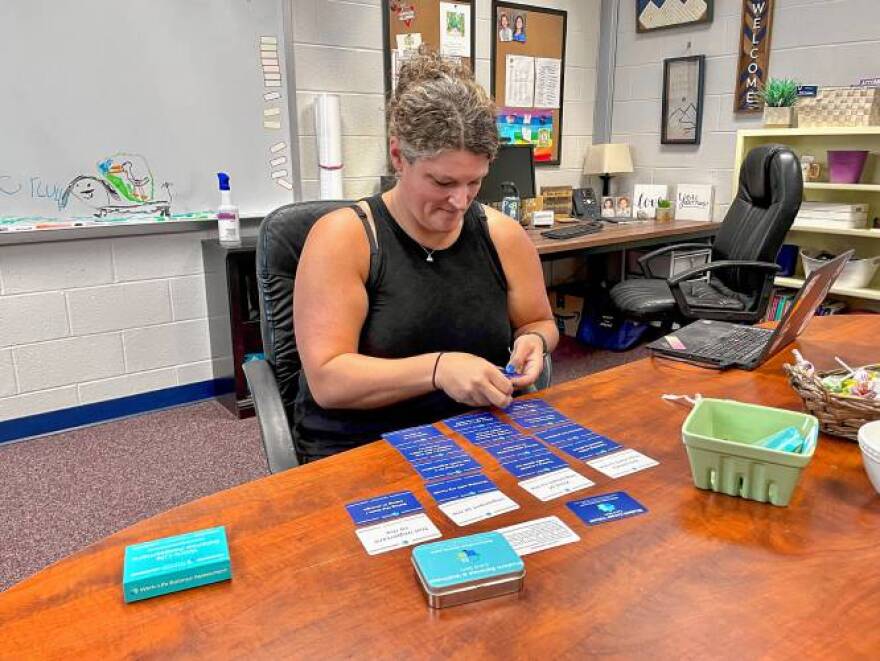This story was originally produced by the Concord Monitor. NHPR is republishing it in partnership with the Granite State News Collaborative.
Heidi Pauer’s work-life balance went askew as her life circumstances shifted, leaving her mentally drained.
She wanted to get her priorities sorted and get back on track.
“I just needed something to shift because what was working before wasn’t working for me or our family anymore,” confessed Pauer, an educator in Bow for 25 years.
While juggling her life’s changes and career demands, Pauer stumbled upon a ‘Balanced Card Sorts’ through a simple Google search. This interactive tool became her sanctuary, helping her realign her wellness and career goals.
The essence of this tool lies in a simple yet effective concept: a deck of cards, each with a statement relating to the eight dimensions of a wellness wheel: emotional, physical, occupational, environmental, financial, spiritual, social, and intellectual.
By sorting these cards, individuals can introspect and categorize their priorities, aligning them with their personal values and aspirations.
For instance, a card might contain statements like “Having a mentor to guide me” or “Working in my local community.”
Since discovering the tool, Pauer has incorporated it into her routine, using it every three months as a self-assessment to reassess and re-prioritize her goals.
“It’s kind of like what you do with a car to get an oil change,” explained Pauer. “There might be nothing wrong but it’s important to have the oil changed. So I’ll use the wellness cards to see if I’m in alignment.”
The tool’s impact on Pauer’s life didn’t let her stop there. She wanted to introduce them to her students in her classroom as a means of helping them find clarity in their lives.
However, at that time, there was no student version of the cards available.
So Pauer reached out to the founder, Anush Hassan, and decided to pilot the cards in her classroom while the student version was in development.
“It really was the clarity, the clarity of priorities, that really helped me in my own life. So I figured it would be helpful to other people as well,” said Pauer who piloted it in her poetry class.
Soon, Pauer roped in Beth Corkum, the school district’s coordinator of wellness and equity, to join in and try the cards with the students.
Now a set of cards is available in Corkum’s office, accessible to students and staff at any time.
“The point is that you are taking time to self-reflect and recognize what your priorities are to then be able to move forward with your goals and values,” explained Corkum.
To make this initiative possible, the school district invested $1,959 in digital access codes, student wellness starter packs, card decks, workbooks, and work-life balance assessment materials.
This initiative began with freshmen last year but is set to expand to other students. The school district is also the first to roll out the tool to its staff and students.
Molly McCarthy, a sophomore at Bow High School, shared a similar experience.
“It was interesting to see my thoughts right in front of me instead of just thinking about it. It made me recognize what my plan is for after high school and what’s important for me, health-wise,” said McCarthy.
The wellness tool is not limited to physical cards; it is also available as a digital tool, accessible with a code.
In classrooms, students use a workbook to sort their cards, identify their priorities and journal.
For Corkum, this tool has opened the door to meaningful conversations with students, allowing her to truly understand their aspirations. Furthermore, the ability to collect data on student priorities and goals over time offers educators valuable insights to guide students toward success.
Corkum said while the tool works for students, having a way to collect data on student priorities and goals over time would offer educators valuable insights to guide students toward success.
This initiative is not just about supporting students but also about caring for the well-being of the school district’s staff.
We’ve done a ton of things to support the kids, but we were kind of feeling like we need to take care of ourselves, so we can take care of the kids,” said Corkum. “If we’re not feeling our best as employees and staff members, then we’re not able to provide the best for the kids every day.”






